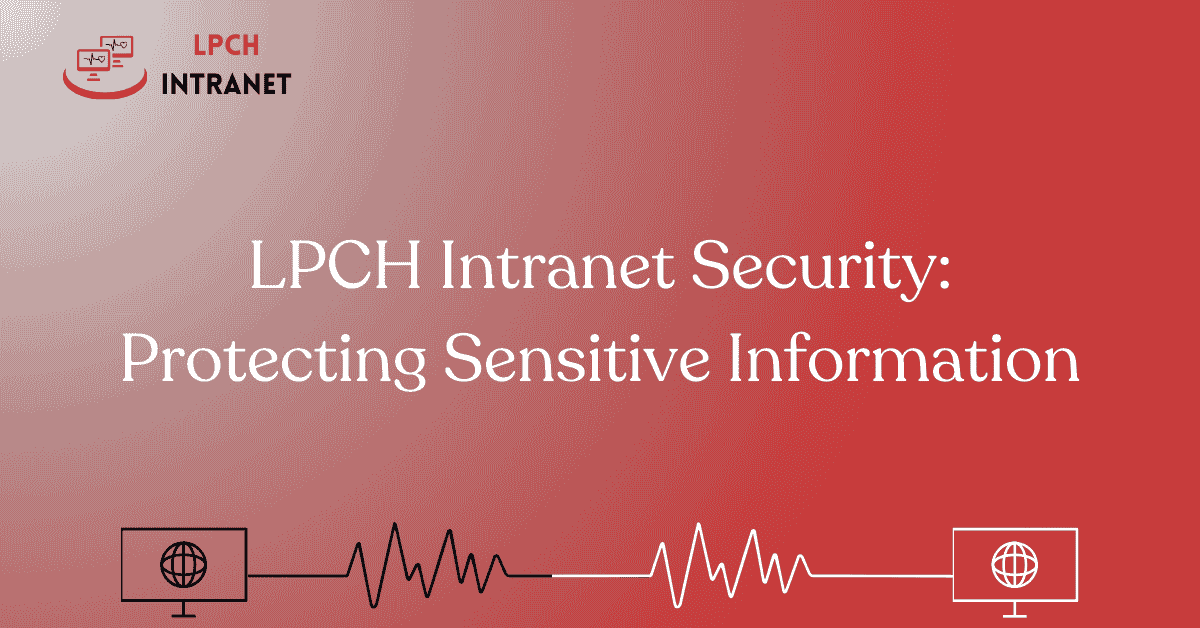LPCH Intranet Security: Protecting Sensitive Information
The LPCH Intranet Security team is dedicated to safeguarding sensitive information and maintaining the highest level of data protection. With the increasing number of cyber threats and the potential for data breaches, it is crucial for us to implement robust security measures to ensure the confidentiality, integrity, and availability of our organization’s data.
We understand the importance of protecting sensitive information, such as patient records, financial data, and confidential research. Our team works tirelessly to stay updated on the latest security threats and technologies to continuously enhance our security posture. We employ a multi-layered approach to security, including firewalls, intrusion detection systems, encryption, access controls, and regular security audits.
Our Commitment to Data Protection
At LPCH Intranet Security, our top priority is safeguarding sensitive information and maintaining the highest level of data protection. With the increasing number of cyber threats and the potential for data breaches, we understand the crucial need for robust security measures.
Continuous Enhancement of Security Measures
We continuously strive to enhance our security posture by staying updated on the latest security threats and technologies. Our dedicated team works tirelessly to ensure the confidentiality, integrity, and availability of our organization’s data.
A Multi-Layered Approach to Security
We employ a multi-layered approach to security, utilizing various measures to protect our sensitive information. This includes the implementation of firewalls, intrusion detection systems, encryption, access controls, and regular security audits.
Firewalls: Protecting the Perimeter
Firewalls are a crucial component of our security infrastructure. They act as a barrier between our internal network and external threats, filtering out unauthorized access attempts and potential malicious activities.
Intrusion Detection Systems: Early Threat Detection
We utilize intrusion detection systems to monitor our network for any suspicious activities or unauthorized attempts to access our data. These systems help us detect potential threats at an early stage and take immediate action to mitigate risks.
Encryption: Securing Data in Transit
Encryption is essential to ensure the confidentiality of our data during transmission. We utilize strong encryption algorithms to protect sensitive information, making it unreadable to unauthorized individuals even if intercepted.
Access Controls: Restricting Unauthorized Access
We implement strict access controls to ensure that only authorized individuals have access to sensitive data. This includes user authentication mechanisms, role-based access controls, and regular access reviews to prevent unauthorized access to our systems.
Regular Security Audits: Assessing Vulnerabilities
We conduct regular security audits to assess the effectiveness of our security measures and identify any potential vulnerabilities. This allows us to proactively address any weaknesses and ensure that our data protection measures are up to date.
FAQs
What is LPCH Intranet Security?
LPCH Intranet Security refers to the measures and protocols in place to protect sensitive information within the LPCH intranet system. It includes various security measures, such as firewalls, encryption, access controls, and regular security audits to ensure the confidentiality, integrity, and availability of sensitive data.
Why is protecting sensitive information important?
Protecting sensitive information is crucial to maintain the privacy and trust of patients, employees, and stakeholders. Breaches in security can lead to unauthorized access, identity theft, financial loss, and reputational damage. By implementing robust security measures, LPCH ensures the confidentiality of sensitive data and compliance with privacy regulations.
What are some common threats to LPCH Intranet Security?
Common threats to LPCH Intranet Security include malware attacks, phishing attempts, insider threats, unauthorized access, and data breaches. These threats can compromise the confidentiality, integrity, and availability of sensitive information, leading to severe consequences for both individuals and the organization.
How does LPCH protect against malware attacks?
LPCH employs various strategies to protect against malware attacks. This includes regular antivirus and anti-malware software updates, email filtering to block suspicious attachments, employee education on recognizing phishing attempts, and network monitoring for anomalous activities. These measures help prevent malware from infecting the intranet system and compromising sensitive information.
What are the access controls implemented by LPCH?
LPCH implements access controls to ensure that only authorized individuals can access sensitive information. This includes user authentication through strong passwords or multi-factor authentication, role-based access control to limit privileges based on job roles, and regular access reviews to revoke access for inactive or terminated employees. These controls help prevent unauthorized access and mitigate the risk of data breaches.
How often does LPCH conduct security audits?
LPCH conducts regular security audits to assess the effectiveness of its security measures and identify potential vulnerabilities. These audits are typically conducted annually or as required by regulatory standards. By conducting security audits, LPCH can proactively identify and address security gaps, ensuring the ongoing protection of sensitive information.
Conclusion
LPCH Intranet Security is dedicated to protecting sensitive information and maintaining the highest level of data protection. Through our continuous enhancement of security measures, multi-layered approach, and utilization of advanced technologies, we strive to ensure the confidentiality, integrity, and availability of our organization’s data.







